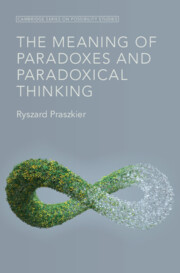Book contents
- The Meaning of Paradoxes and Paradoxical Thinking
- Cambridge series on possibility studies
- The Meaning of Paradoxes and Paradoxical Thinking
- Copyright page
- Contents
- Figures
- Tables
- Acknowledgments
- Introduction
- Part 1 Paradoxes and What They Do to Us
- Introduction
- Chapter 1 Defining the Concepts
- Chapter 2 Mind and Paradoxes
- Chapter 3 The Influence of Paradoxical Thinking and How to Evaluate It
- Discussion and Summary
- Part II Sudden Unexpected Changes
- Part III Challenging the Impossible
- Part IV Peace and Its Challenges
- Part V Paradoxes and Creativity
- Part VI Paradoxes in Action
- References
- Index
Chapter 2 - Mind and Paradoxes
from Part 1 - Paradoxes and What They Do to Us
Published online by Cambridge University Press: 04 April 2025
- The Meaning of Paradoxes and Paradoxical Thinking
- Cambridge series on possibility studies
- The Meaning of Paradoxes and Paradoxical Thinking
- Copyright page
- Contents
- Figures
- Tables
- Acknowledgments
- Introduction
- Part 1 Paradoxes and What They Do to Us
- Introduction
- Chapter 1 Defining the Concepts
- Chapter 2 Mind and Paradoxes
- Chapter 3 The Influence of Paradoxical Thinking and How to Evaluate It
- Discussion and Summary
- Part II Sudden Unexpected Changes
- Part III Challenging the Impossible
- Part IV Peace and Its Challenges
- Part V Paradoxes and Creativity
- Part VI Paradoxes in Action
- References
- Index
Summary
Our minds, when confronted with paradoxes, react differently. In some cases, they benefit from paradoxes. Being open to paradoxes is a trait called paradoxicality. Embracing contradictions is one of the paths for paradoxicality, especially that embracing contradictions can enhance the creativity of individuals and teams. Similarly, conceptual blending is a method of generating new ideas by combining two concepts. It involves cognitive processes that combine words, images, and ideas within a mental network to create meaning. Contemporary perspectives indicate that the tensions between opposing ideas can be constructive (differing from the Festinger’s belief that the tension between contradictions is unpleasant and the mind tends to reduce it). An example is Janusian thinking, drawing inspiration from Janus, an ancient Roman god with two faces looking in opposite directions. Niels Bohr, for example, believed that by holding opposites together, the mind can reach a new level where traditional convergent thinking is suspended. Paradoxical thinking refers to an individual’s internal contradictions and posits that limitations arise from an individual’s limited frame of reference, particularly when avoiding internal paradoxes. Paradoxical thinking is understood here as a cognitive process marked by contradictions.
Keywords
- Type
- Chapter
- Information
- The Meaning of Paradoxes and Paradoxical Thinking , pp. 19 - 23Publisher: Cambridge University PressPrint publication year: 2025

